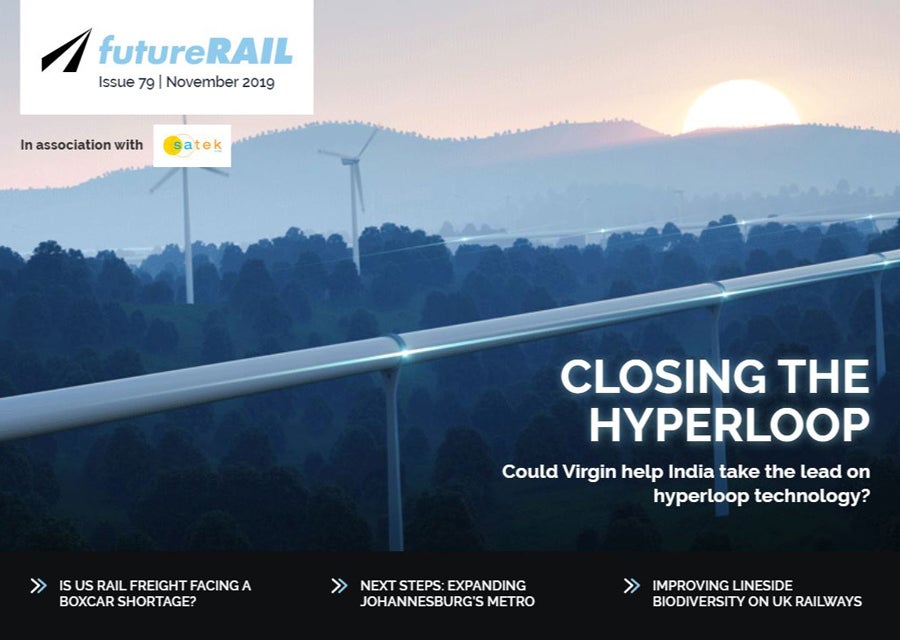
Future Rail is back for another issue packed with technology news and industry analysis. In this issue, we delve into an ongoing project to build a Hyperloop system in India, explore whether the US rail freight sector is experiencing a boxcar shortage, and ask how predictive mapping could help railways cut noise emissions.
Whether you are on a desktop, tablet or smartphone, you can read the magazine for free online.
In this issue
Continental rail passes: what can we learn from the twists and turns of Eurail?
In August this year, Britain’s Rail Delivery Group announced it would no longer sell Eurail passes in favour of its own BritRail. However, subsequent heavy criticism from the industry led it to revoke its decision the next day. But was it wrong to say the two passes were confusing, and who gets to decide which passes offer what to whom? Adele Berti takes a closer look.
Save A Train: the Israeli start-up looking to revolutionise ticketing in Europe
Save A Train is an Israeli start-up bidding to simplify and digitise railway ticketing, making it more efficient and more financially attractive than its aviation alternative. CEO and founder Udi Sharir gives Adele Berti an inside track on Save A Train and how it hopes to unlock new opportunities in Europe.
Will India be the first to see a Hyperloop One train in action?
In July 2019, the Indian Government gave the final nod for construction of a Hyperloop train between Mumbai and Pune. While several countries worldwide have unveiled plans to build this version of a high-speed train for years, India might take the lead in doing so. Varsha Saraogi take a closer look at the project.
What now for Johannesburg’s Gautrain?
A new report heralds the success of Johannesburg’s Gautrain rail network as pivotal in creating jobs and boosting the metropolitan area it serves. With expansion plans in progress, how has this metro helped to alleviate traffic congestion and what does the future hold for this innovative railway? Adele Berti finds out.
How predictive mapping can help railways cut noise pollution
Rail is widely acknowledged to be the transport mode with the lowest environmental impact. However, noise and vibration remain an important issue that must be addressed. Varsha Saraogi explores the potential of mapping technology to predict noise patterns.
Outside the box: can the US rail freight sector avoid a boxcar shortage?
The US boxcar fleet has shrunk by a third in ten years and a further 40% are projected to drop out of service in the next decade. Do leasing regulations need to be overhauled to incentivise investment? Julian Turner talks to E. Michael O’Malley and Randy Thomure of the Railway Supply Institute (RSI).
The mission for biodiversity on the UK’s rail network
With as many as 13 million trees within falling distance of its rails, the UK’s rail network operator, Network Rail, faces a difficult balancing act when it comes to maintaining both rail safety and biodiversity. Andrew Tunnicliffe investigates how the company plans to meet newly-introduced targets whilst maintaining safety and facilitating growth.
Six of the best tram systems around the world
A study conducted by Eurogroup Consulting evaluated 32 tram networks around the world comparing them by multimodal integration, speed, pricing, reliability and ridership. Varsha Sar look at the tram systems which won the gold and silver in the three categories – namely best-performing trams in large cities, mid-sized cities and historic tram systems
Next issue
The Washington State Department of Transportation has published a business case study on the possibility of delivering an ultra-high-speed rail line connecting the key cities of Portland, Seattle and Vancouver. What are the potential benefits and risks of an ultra-high-speed rail line for the Pacific Northwest?
Focusing on London, UK, we explore how the capital’s famous Oyster Card has evolved alongside current passenger trends, and analyse signalling problems that are stymieing the city’s Crossrail project.
After Toshiba Digital and Consulting Corporation recently announced it was bringing its digital twin software package to Greater Anglia timetables, we ask how AI can help keep trains running on time.
Finally, we map out successful (and less successful) crowdfunded train projects around the world, and round up cutting-edge tech solutions that could assist with overcrowding on train platforms.



